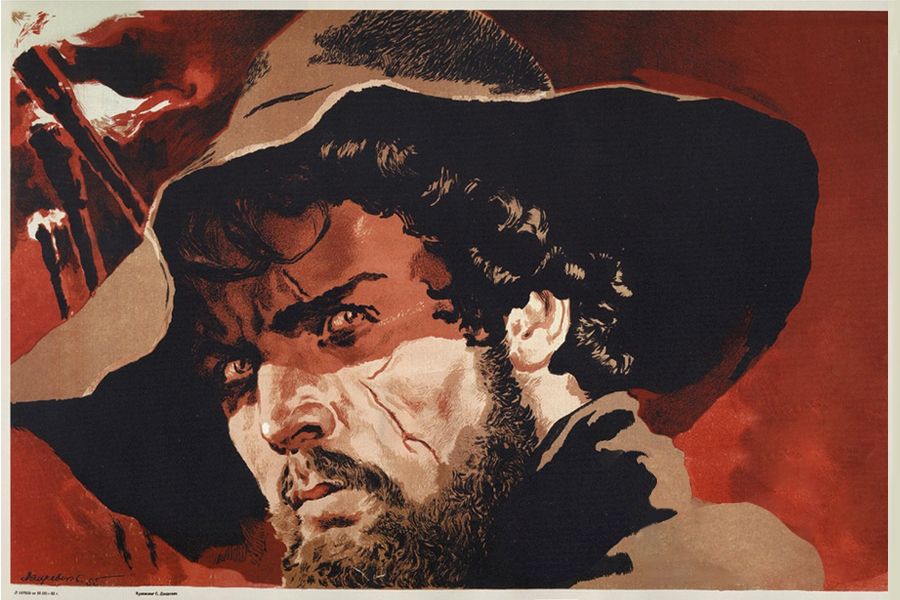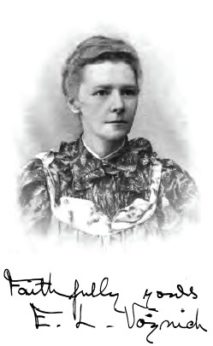
image from the cowl of an edition of 'The Gadfly.' | via Mariinsky Theatre
Liam Mellows examine this novel looking forward to his execution, along with the different condemned and his comrades, imprisoned by the Irish Free State within the civil conflict (1922-23), for opposing the Treaty which gave ireland Dominion reputation inside the British Empire, instead of establish an independent Irish Republic. Fellow prisoner Peadar O'Donnell writes: "it is a curious fact, which most of the Mountjoy prisoners need to be without problems able to do not forget, that it became around the days that the Gadfly changed into being widely examine in 'C' wing; it's a story of Italian revolution with a ghastly execution scene.… MacKelvey…selecting up the Gadfly…saying all over again: 'God, i am hoping they don't mess up any of our lads this way.' MacKelvey turned into to remember the Gadfly next morning."
What turned into this e-book, so widely study by using Republicans in eire and the Labour circulate in Britain in its personal day?
This novel of revolution turned into posted in new york in 1897 and a few months later in London, two years after its completion. It carried out cult reputation within the u.s. and China, promoting tens of millions of copies. Two movie versions have been made within the united states, one silent (1928), the different (1955) with a ranking through Dmitri Shostakovich. Its author, Irish-born Ethel Voynich, became carefully linked to revolutionary circles in London, Berlin, and Russia.
 by country wide e-book League – Frontispiece of ebook news, Public domain. Wikimedia Commons.
by country wide e-book League – Frontispiece of ebook news, Public domain. Wikimedia Commons. Ethel Lilian Boole turned into born may eleven, 1864, in County Cork, the youngest of five daughters of the well known mathematician professor George Boole and Mary Boole, psychologist and philosopher. Ethel's father died almost immediately after her birth, and her mother took the family unit to London, returning to ireland regularly all the way through her childhood. It was on one of these visits to eire that she first examine Giuseppe Mazzini, leader of the Italian Risorgimento flow.
at the age of 18, she went to study song in Berlin for 3 years (1882–eighty five). There she met Russian revolutionaries, and when she lower back to London, she realized Russian from the exiled progressive Stepniak (Sergei Kravchinski), who had fled Russia after assassinating the manager of the Czarist secret police. Later, she traveled in Russia, staying with Stepniak's sister-in-legislations Preskovia Karauloff in St Petersburg for 2 years (1887–89). Preskovia become a doctor, whose husband became a political prisoner. Ethel helped Preskovia deal with impoverished peasants. She also gave music training and linked to households of political prisoners whom she met through Preskovia.
returned in London, Ethel met a Polish political exile, currently escaped from Siberia (Poland turned into a part of the Russian Empire at the moment), who Anglicized his name to Wilfred Michael Voynich. Transported to Siberia for participation in the Polish liberation circulate against the Czarist regime, he escaped to England in 1890. Ethel and Wilfred worked together with Stepniak printing modern literature and banned books and smuggling them into Russia, together with translations of Marx's and Engels's writings. together with other revolutionaries, they centered the Russian Free Press Fund. Ethel herself undertook a clandestine journey to Lvov in Ukraine to prepare the smuggling of unlawful publications into Russia. involved in these Russian émigré circles turned into one more Russian exile and agent, Sigmund Rosenblum, alias Sidney Reilly, carried out in 1925 for his role in a coup d'état against Lenin and the us. Legend is connected to Ethel and "Sidney" having an affair in Italy.
From these experiences and circle of affiliates, Voynich drew the stuff from which the novel is made. It is decided in 1840s Italy at the time of its standard rebel in opposition t Austrian domination, the Risorgimento.
the radical's main characters belong to Mazzini's underground party, younger Italy, energetic in the country wide liberation movement. an exciting plot roots the readers' sympathy with the writer's. it's comprehensible how this book captured the creativeness of readers who sympathized with movements in opposition t oppression and domination. "several of them belonged to the Mazzinian party and would had been satisfied with nothing below a democratic Republic and a United Italy." it's obtrusive why the Anti-Treaty prisoners, captured throughout the civil warfare in ireland, identified with the characters within the book.
This domination became not basically exercised by way of a international vigour. Reflecting ancient fact, the radical sharply criticizes the Catholic Church's lively opposition to the movement for a united Italy, expressed in a father and son conflict that deepens the import: an Italian reluctantly inclined to sacrifice his son and the cause of freedom, and Italy's future, for the sake of faith. The writer leaves little doubt related to her own stance. truly, the novel's declared atheism have to have contributed to its being banned by using the Irish State in 1947.
The spirit of revolution is not limited to individuals of the young Italy flow. It has covert assist throughout the population, evidenced in many scenes within the novel. typical individuals support the circulate smuggle fingers across borders, come to their personal support, even reformatory wardens back them. in reality, within the scene pointed out with the aid of MacKelvey, the firing squad tries to give protection to their secret hero. So, on the conclusion of the 19th century, we see a new class evolving inside the English novel, one whose hero and heroine are revolutionaries and a part of a modern liberation move.
Written at a time of overseas suffrage movements, the primary female character, Gemma Warren, is a woman the circulation respects particularly. She is impressed not most effective via Voynich's personal adventure but also by way of different women revolutionaries across the author. Gemma is not purely an emancipated girl; she is additionally a revolutionary woman, on the core of the movement. in this means, she goes past the literary heroines of the late nineteenth century and anticipates the proletarian ladies Gorky would write about. "those that noticed her most effective at her political work viewed her as a informed and disciplined conspirator, trustworthy, brave, in each approach a effective member of the birthday celebration, but by some means lacking in existence and individuality. 'She's a born conspirator, value any dozen of us; and he or she is nothing more,' Galli had noted of her." Voynich brings now not only the modern neighborhood as relevant to the uncon ventional plot but, as a essential a part of this neighborhood, a brand new category of woman.
Given Voynich's internationalism and journey, it is bewildering to discover racist sentiments towards South americans and Black americans expressed in this booklet. This racism additionally impacts the portrayal of girls of color, as readers will find. It appears that Voynich's novel didn't discover a lot resonance in Cuba and different Latin American nations, nor in Africa, all waging heroic liberation struggles. extraordinarily, critics have not drawn attention to this factor. in its place, in the event that they dislike it, it's as a result of its unashamed atheism, so atypical for its time, or for its partisanship for a revolutionary circulation.
before the outbreak of the first World war, Wilfred Voynich grew to be worried in the Society of chums of Russian Freedom. He ran a rare book shop in Soho, which he additionally used for cash laundering and smuggling progressive Marxist literature into Russia. once more, Ethel commonly worked as a courier for the company.
Wilfred's most excellent reputation is linked to a Renaissance manuscript he discovered in 1912. Later, he brought this with him to big apple, where he moved in 1915 and persevered within the ebook business. The doc that became accepted because the "Voynich Manuscript," was written in a code that to this day has not been deciphered. lots secret surrounds this script; one opportunity is that it is an difficult hoax, manufactured through Voynich, who held a level in chemistry.
Ethel all started writing full time, authoring three extra novels: Jack Raymond (1901), Olive Latham (1904), and An Interrupted Friendship (1910). She additionally translated some poetry by using Shevchenko and Lermontov into English, posted in 1911.
She worked with the Quakers as a social worker in London's East end right through World war I and left Britain for good around 1920 when she joined Wilfred in ny. There is not any extra counsel about active political work. Wilfred died in 1930. Ethel returned to track, composed musical works together with the "Epitaph in Ballad form," committed to the Irish innovative Roger Casement, who turned into hanged in Pentonville detention center, London, on August three, 1916. She also translated composer Frederic Chopin's letters into English. None of her later novels done the first-rate or the reputation of The Gadfly.
Soviet literati in 1955 found out that Ethel was nevertheless alive in ny, aged 91. This led to an enormous sensation in the u.s. and resulted within the charge of royalties. Ethel persevered to live quietly along with her companion, Anne Nill, who had once managed Wilfred's new york ebook business. They lived collectively for thirty years within the heart of manhattan, in an condominium at London Terrace on West twenty fourth road. Ethel Voynich died 60 years in the past, on July 27, 1960, at the age of ninety six.
No comments:
Post a Comment